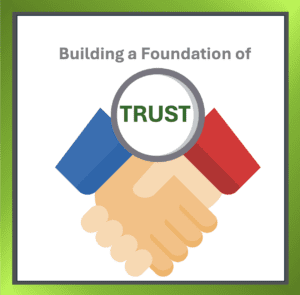Building a Foundation of Trust
Organisations that prioritise trust and connection among their teams consistently outperform those that don’t. At Tick HR Solutions, we’ve observed how these elements create resilient workplaces that attract and retain top talent while supporting innovation and productivity.
Why Trust Matters in the Modern Workplace
Trust forms the bedrock of effective workplace relationships. When employees trust their leadership and colleagues, they’re more willing to collaborate, share ideas, and take productive risks. This psychological safety translates directly to improved business outcomes through:
- Enhanced creativity and problem-solving
- Increased employee engagement and retention
- Greater adaptability during organisational change
- More authentic communication at all levels
Practical Strategies for Building Workplace Trust
- Consistent and Transparent Communication
Open communication channels are essential. Leaders should share information consistently, explain the reasoning behind decisions, and create forums where employees feel comfortable expressing concerns without fear of repercussion.
- Follow Through on Commitments
Nothing erodes trust faster than broken promises. Organisations must ensure that commitments made to employees, whether about career development, working conditions, or company direction, are honoured and delivered upon.
- Recognise and Value Contributions
Employees who feel their efforts are acknowledged and appreciated are more likely to develop trust in their workplace. Recognition doesn’t always need to be grand gestures, consistent, specific appreciation of good work builds connection over time.
- Create Opportunities for Meaningful Connection
In both remote and in-person environments, structured opportunities for team members to connect on a personal level help build the relational foundation necessary for trust. Consider:
- Team-building activities focused on collaboration rather than competition
- Cross-departmental projects that expand employees’ internal networks
- Mentoring programmes that foster knowledge sharing
- Regular informal check-ins that go beyond task updates
Measuring Trust in Your Organisation
Building trust isn’t a one-time initiative but an ongoing commitment. Organisations should regularly assess workplace trust through:
- Employee feedback surveys
- Retention metrics
- Participation in voluntary company initiatives
- Quality of ideas shared in meetings and collaborative sessions
The Business Case for Investing in Trust
*Research consistently shows that high-trust organisations experience:
- 50% higher productivity
- 76% higher engagement
- 40% less burnout
- 29% more satisfaction with their lives
At Tick HR Solutions, we’ve helped organisations implement practical strategies that build lasting trust among their teams. By investing in the human elements of your business, you create a foundation for sustainable success that withstands market fluctuations and industry disruption.
Remember: trust isn’t built overnight, but through consistent actions that demonstrate reliability, competence, and genuine care for your people.
*Gallup & Edelman

